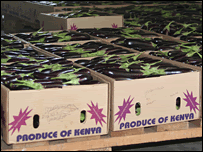Message to Euro-Americans: eat local food, buy global biofuels
 The BBC has an interesting story on how Mr Peter Ndivo and Mr Samuel Mauthike, both small Kenyan farmers, are affected by the confusion around concepts such as 'carbon footprints', 'fair trade' or 'food miles'.
The BBC has an interesting story on how Mr Peter Ndivo and Mr Samuel Mauthike, both small Kenyan farmers, are affected by the confusion around concepts such as 'carbon footprints', 'fair trade' or 'food miles'.Euro-American consumers buy large quantities of fresh luxury products, such as orchids, baby corn, tiny tomatoes, palm hearts, mangos or carambola stars. Most of these exotic vegetables, fruits and flowers are grown by small farmers in the tropics, like Peter and Samuel. The products are flown to Euro-America on a daily basis, in jumbo jets. The smallholders depend on the market for their livelihoods - it feeds their families and allows them send their children to school.
Now consumers in the West have decided "to do something" about global warming, as individuals. They read up on things and experiment with concepts such as 'food miles': calculate how much greenhouse gas emissions a locally grown vegetable is worth, compared to one flown in from, say, Kenya. If the Kenyan vegetable - the baby corn or the mango - is "guilty" of more carbon emissions, the wealthy consumer in Europe or America decides to stop buying it. Problem solved. A clear conscience... But the Kenyan farmer falls back into poverty because he just lost his lucrative market.
If the consumer in Europe and America really wants to start buying local food to reduce greenhouse gas emissions, then that is allright, provided he starts buying globally produced biofuels to compensate for the loss of markets faced by the poor farmers in the South. The Kenyan baby corn grower could switch to big corn for ethanol instead. Or better, he would grow woody biomass, sweet potatoes, cassava, sweet sorghum or sugarcane - highly efficient crops to make solid and liquid biofuels from. Contrary to luxury fruits, vegetables or flowers, biofuels do not have to be served 'fresh' and flown in by air. They can be stored and shipped to Europe and America very efficiently, in huge tankers and ships.
The International Energy Agency's Bioenergy Task 40, which studies the feasibility of sustainable trade in biofuels, has thoroughly analysed long-distance transport and found that the greenhouse gas emissions arising from shipping biofuels from the tropics to the ports of Europe and America, are negligeable. After their long trip in huge and efficient tankers, the biofuels from the South still dramatically reduce greenhouse gas emissions when used by Europeans and Americans in their cars. They mitigate climate change far better than biofuels produced in Europe or the US, simply because they are far more efficient to produce (earlier post). One hectare of sugar cane delivers 8 to 10 times more energy than a hectare of corn grown in the US. If imported by Europe or the US, the sugar cane ethanol is still 7 to 9 times more energy efficient upon arrival (earlier post). Higher energy efficiency ultimately means lower carbon emissions.
In short, our message to wealthy consumers in the West is simple: buy local food if you think this will change global warming (which is not always the case), but please buy globally produced biofuels. You will help millions of farmers in the South, and you will reduce carbon emissions far more radically than if you were to use inefficient biofuels made in Europe or America. You have the money and the power. Spend it wisely.
More information:
IEA Bioenergy Task 40: International bioenergy transport costs and energy balance
IEA Bioenergy Task 40: Life cycle inventrory of existing biomass import chains for green electricity production [*.pdf]
IEA Bioenergy Task 40: Sustainability of brazilian bioethanol [*.pdf], and see earlier post [entry ends here].
 ethanol :: biodiesel :: biomass :: bioenergy :: biofuels :: energy :: sustainability :: climate change :: greenhouse gas emissions :: food miles :: Africa ::
ethanol :: biodiesel :: biomass :: bioenergy :: biofuels :: energy :: sustainability :: climate change :: greenhouse gas emissions :: food miles :: Africa ::  -------------------
-------------------
 Spanish company Ferry Group is to invest €42/US$55.2 million in a project for the production of biomass fuel pellets in Bulgaria.
The 3-year project consists of establishing plantations of paulownia trees near the city of Tran. Paulownia is a fast-growing tree used for the commercial production of fuel pellets.
Spanish company Ferry Group is to invest €42/US$55.2 million in a project for the production of biomass fuel pellets in Bulgaria.
The 3-year project consists of establishing plantations of paulownia trees near the city of Tran. Paulownia is a fast-growing tree used for the commercial production of fuel pellets.









0 Comments:
Post a Comment
Links to this post:
Create a Link
<< Home